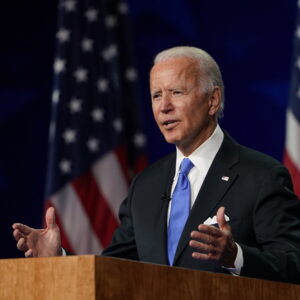by The Cowl Editor on February 4, 2021
National and Global News

by Katherine Morrissey ’22
News Staff
On Jan. 20, at 12 p.m., Joseph R. Biden, Jr. was sworn in as the 46th President of the United States. While his inauguration marked the end of President Donald Trump’s four-year term and an unprecedented election cycle, it also came at the end of a historic month of strife and terror.
As legislators joined to officially count and certify electoral votes, a large crowd gathered nearby for what would become one of President Trump’s most memorable rallies. However, what followed on this date would shock the nation to its core.
Around 1 p.m., Americans watched as rioters from the protests began to attack Capitol police as they attempted to enter the Capitol building. Their motive: to delay and stop the certification of the election. Due to concerns about the violent nature of the event, legislators were ordered to shelter and eventually evacuate.
By 2 p.m., the rioters had breached the Capitol by scaling walls, breaking windows, and passing through security with violent force. An hour later, they reached the House Chamber armed with zip ties and cell phones to record their actions. Many videos and photos that rioters took on the Senate floor eventually began circulating the internet and news channels, with some images depicting disturbing symbols of white supremacy.
The Capitol was not secured until after 5 p.m. Following the attack, about 1,100 National Guard troops were mobilized. Congress was able to reconvene by the late evening and eventually certify the remaining electoral votes, but not before five individuals lost their lives in the assault.
Three police officers died in the days immediately following the Capitol riot: Brian Sicknick, who died of injuries sustained during the incident, and Howard Liebengood and Jeffrey Smith, who took their lives after defending the Capitol building on Jan. 6. Their deaths highlight a stark contrast between the attack on Capitol police and the Republican Party, which prided itself on “backing the blue” and supporting law enforcement.
During and following the events at the Capitol, many criticized President Trump’s language and overall delay in response, claiming he did not condemn the actions of those involved, and in some situations, seemed to incite or support it.
During the rally, President Trump continued to assert the false notion that the election results were invalid, stating, “We won this election, and we won it by a landslide.” He continued, “We will stop the steal,” in reference to the election. He also stated, “If you don’t fight like hell, you’re not going to have a country anymore,” which some have considered to be the inflammatory spark that ignited a day of unrest and destruction.
After months of spreading misinformation through social media and then his failure to explicitly condemn the attack, President Trump’s personal Twitter account was permanently deleted by the company.
The attack seemed to come as a continuation of the Trump administration’s refusal to partake in the peaceful transition of power and ultimately accept the results of the 2020 election. President Biden spoke of pain prior to his inauguration in a speech given at a COVID-19 memorial at the reflecting pool in Washington, D.C. He stated, “To heal, we must remember. It’s hard sometimes to remember. But that’s how we heal. It’s important to do that as a nation.”
Many across the nation can resonate with the statement. The inauguration and a new administration will not erase the pain of the tumultuous times felt by the nation, rather, it will continue to remember this pain in order to successfully move forward.
Despite President Trump’s refusal to concede, the violent threats against democracy, and the chaos of a pandemic, the country moved forward on Jan. 20, with the inauguration of Joseph R. Biden as President of the United States.
President Biden, at 78, is now the oldest president to be inaugurated into office. He also serves as the second Catholic president in office, decades after President John F. Kennedy. Kamala Harris became the first female, Black, and South Asian American vice president, demonstrating what a significant and historic moment this day was for the country.
Biden stated in his inaugural address, “This is America’s day. This is democracy’s day. A day of history and hope, of renewal and resolve. Through a crucible for the ages, America has been tested anew. America has risen to the challenge.”
Following a year of unprecedented turmoil, the United States now has the chance to reaffirm its commitments to democratic ideals and to move forward to overcome the challenging nature of these times.